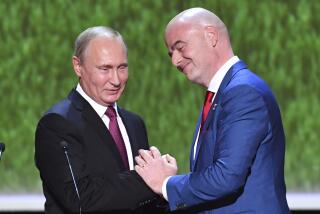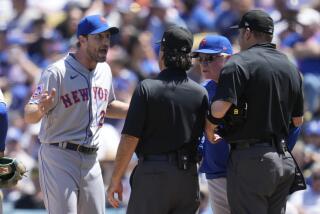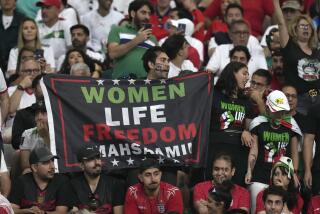WORLD CUP USA ’94 / THE FIRST ROUND : FIFA in Tune With Other Sports : Drugs: Soccer’s governing agency uses random testing but deviates in area of sanctioning.
- Share via
DALLAS — Although soccer has not been stung by doping controversies the way track and field and weightlifting have, the sport has modeled its drug-testing policy after the International Olympic Committee, one of the most strident anti-drug groups.
Since 1986, FIFA, soccer’s governing body, has adopted IOC guidelines except in the area of sanctioning.
“In soccer, it’s really rare to have drug problems,” said Anthony Daley, chief medical officer for World Cup ’94.
But random testing is used during World cup matches to protect the integrity of the sport. Under FIFA regulations, two players are randomly selected from each team after each World Cup match and are required to give a urine sample.
One such sample, taken Saturday from aging star Diego Maradona of Argentina, showed traces of ephedrine, a banned substance found in over-the-counter medications.
FIFA officials will announce today in Irving, Tex., whether Maradona failed the drug test and will be suspended.
Ephedrine is included under a long list of stimulants banned by soccer, the IOC, the NCAA and other sports organizations. Also listed among the group is caffeine in excessive amounts.
Other generic lists of banned substances are narcotic analgesics, anabolic steroids, beta-blockers and diuretics, which are taken to mask muscle-building agents.
FIFA’s methods for collecting samples are uniform with other organizations. Each specimen is divided into two, and the “B” sample is analyzed if the “A” sample is positive. The system is designed to protect the individual against a false-positive or laboratory mistake.
Curiously, FIFA’s policy deviates from most organizations in its system of sanctioning.
If a result proves positive on both samples, the Organizing Committee forms a special commission, which determines the degree of responsibility and then metes out punishment.
Banned Stimulants
Some banned stimulants and over-the-counter substances in which they are contained:
Stimulant: Pseudoephedrine
Over-the-counter product: Actifed, Ambenyl, Amemine, Afrinol, Chlorafed, Chlortrimeton-DC, Co-Tylenol, Deconamine, Dimacol, Disphoral, Drixoral, Emprazil, Fedhist, Histalet, Isoclor, Lo-Tussin, Nasalspan, Novafed, Nucofed, Plu-Histine, Polaramine, Expectorant, Pseudo-Bid, PseudoHist, Rhymosyn, Rondec, Ryna, Sudaged, Triprolidine, Tussend.
Stimulant: Phenylephrine
Over-the-counter product: Coricidin, Dristan, NTZ, Neo-Synephrine, Sinex
Stimulant: Ephedrine
Over-the-counter product: Bronkaid, Collyrium with Ephedrine, Pazo Suppository, Wyanoid Suppository, Vitronol, Nose Drops, Nyquil Nightime Cold Medicine, Herbal Teas
SOURCE: U.S. Olympic Committee
More to Read
Go beyond the scoreboard
Get the latest on L.A.'s teams in the daily Sports Report newsletter.
You may occasionally receive promotional content from the Los Angeles Times.






